
A pub is an establishment licensed to serve alcoholic drinks for consumption on the premises. The term public house first appeared in the late 17th century, and was used to differentiate private houses from those which were, quite literally, open to the public as "alehouses", "taverns" and "inns". By Georgian times, it had become common parlance, although taverns, as a distinct establishment, had largely ceased to exist by the beginning of the 19th century. Today, pubs have no strict definition, but CAMRA states a pub has four characteristics:
- is open to the public without membership or residency
- serves draught beer or cider without requiring food be consumed
- has at least one indoor area not laid out for meals
- allows drinks to be bought at a bar

A craft brewery or microbrewery is a brewery that produces small amounts of beer, typically less than large breweries, and is often independently owned. Such breweries are generally perceived and marketed as having an emphasis on enthusiasm, new flavours, and varied brewing techniques.

Boddingtons Brewery was a regional brewery in Manchester, England, which owned pubs throughout the North West. Boddingtons was best known for Boddingtons Bitter (Boddies), a straw-golden, hoppy bitter which was one of the first beers to be packaged in cans containing a widget, giving it a creamy draught-style head.

Brewers Retail Inc., doing business as The Beer Store, is a privately-owned chain of retail outlets selling beer and other malt beverages in the province of Ontario, Canada.
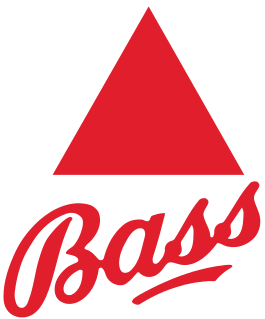
The Bass Brewery was founded in 1777 by William Bass in Burton-upon-Trent, Staffordshire, England. The main brand was Bass Pale Ale, once the highest-selling beer in the UK. By 1877, Bass had become the largest brewery in the world, with an annual output of one million barrels. Its pale ale was exported throughout the British Empire, and the company's iconic red triangle became the UK's first registered trade mark.

In the United Kingdom, a tied house is a public house required to buy at least some of its beer from a particular brewery or pub company. That is in contrast to a free house, which is able to choose the beers it stocks freely.

Beer has been brewed in England for hundreds of years. As a beer brewing country, it is known for top fermented cask beer which finishes maturing in the cellar of the pub rather than at the brewery and is served with only natural carbonation.
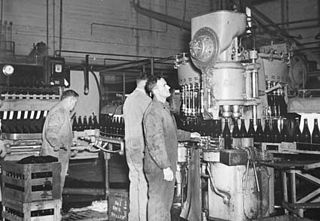
Beer arrived in Australia at the beginning of British colonisation. In 2004 Australia was ranked fourth internationally in per capita beer consumption, at around 110 litres per year; although, the nation ranked considerably lower in a World Health Organization report of alcohol consumption per capita of 12.2 litres. Lager is by far the most popular type of beer consumed in Australia.

Beer in the United States is manufactured by more than 7,000 breweries, which range in size from industry giants to brew pubs and microbreweries. The United States produced 196 million barrels (23.0 GL) of beer in 2012, and consumes roughly 28 US gallons (110 L) of beer per capita annually. In 2011, the United States was ranked fifteenth in the world in per capita consumption, while total consumption was second only to China.
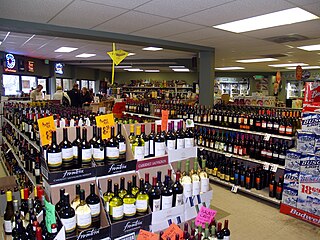
A liquor store is a retail shop that predominantly sells prepackaged liquors – typically in bottles – usually intended to be consumed off the store's premises. Depending on region and local idiom, they may also be called an off-licence, bottle shop / bottle-o liquor store (US) or other similar terms. Very limited number of jurisdictions have an alcohol monopoly. In US states that are alcoholic beverage control (ABC) states, the term ABC store may be used.
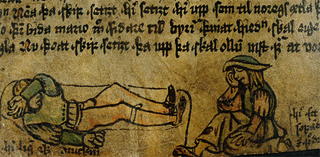
Beer in Iceland likely dates back to the island's settlement by Norsemen. In more modern history beer was effectively banned in Iceland for most of the 20th century. Since that ban was lifted in 1989, Iceland's consumption of beer has increased markedly and new breweries have begun to emerge.

Worthington Brewery, also known as Worthington & Co. and Worthington's, was founded by William Worthington in Burton upon Trent in 1761. It is the second oldest continuously brewed British beer brand after Whitbread. The best known Worthington beers are its Creamflow nitrokeg bitter and White Shield India Pale Ale.

The U.S. state of Vermont is home to several breweries, microbreweries, nanobreweries, and brewpubs that produce a wide variety of beer.
The Supply of Beer Order 1989 and The Supply of Beer Order 1989, commonly known as the Beer Orders, were Statutory Instruments made by the United Kingdom Secretary of State for Trade and Industry in December 1989.
Truman's Brewery was a large East London brewery and one of the largest brewers in the world at the end of the 19th century. Founded around 1666, the Black Eagle Brewery was established on a plot of land next to what is now Brick Lane in London, E1. It grew steadily until the 18th century when, under the management of Benjamin Truman, and driven by the demand for porter, it expanded rapidly and became one of the largest brewers in London. Its growth continued into and through the 19th century with the expansion of its brewery and pub estate. In 1873, it purchased Philips Brewery in Burton and became the largest brewery in the world.

Camerons Brewery Ltd is an English brewery established by John William Cameron in Stranton, Hartlepool, County Durham, in 1865. It is the largest independent brewer in the North East of England, with a brewery capacity of 1.5 million hectolitres and a tied estate of 75 houses. It is one of the oldest industrial concerns in Hartlepool, and has historically been one of the largest employers.
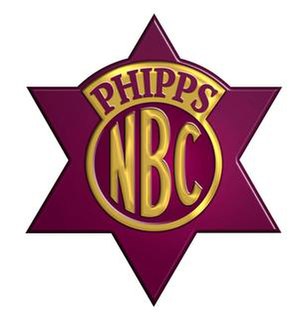
Phipps Northampton Brewery Company Ltd has a long and varied history of brewing real ale and stout. It is based in Northampton, England.
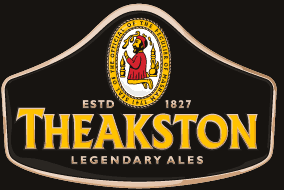
T&R Theakston is a brewery in the market town of Masham, North Yorkshire, England. The company is the sixteenth largest brewer in the UK by market share, and the second largest brewer under family ownership after Shepherd Neame.

Buffalo Bill's Brewery is the first brewpub in America. Buffalo Bill's opened their doors on September 9, 1983, and brewed their first batch of beer on August 2, 1983. In 2018, Buffalo Bill's was inducted into the Smithsonian American History Museum as one of the most historic brewpubs in America.
Beer in Northern Ireland has been influenced by immigration into Ulster, especially from Scotland, and the drinking habits in Ireland until the partition of Ireland. Whiskey drinking was always a tradition with Guinness from Dublin being a strong influence in the style of beer drunk in the 19th and 20th centuries. Brewing traditions almost ceased to exist as smaller breweries closed, or were taken over, and then the large breweries in turn closed down their facilities. The Campaign for Real Ale (CAMRA) was founded in 1971; however, it was 10 years before the first new brewery, Hilden Brewing, opened its doors.
















